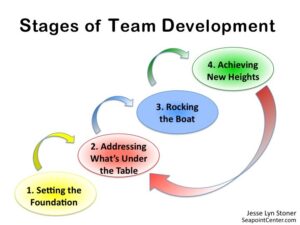 One of the big changes from the pandemic is the team. It’s remote and may never be co-located. Now more than ever it’s important to focus on how to be successful
One of the big changes from the pandemic is the team. It’s remote and may never be co-located. Now more than ever it’s important to focus on how to be successful
I have had the privilege to work with a wide range of teams from the AF Space and Missile Command to a global advertising agency, to teams in small businesses and non-profits and they all have similar traits if they want to succeed. Ironically several of the teams were remote way before the pandemic. They all applied these basic premises
- Purpose.. Why was the team created? What is its reason for existence? How does that fit with the company mission? If the team is aligned in its purpose it will be better focused on achieving the desired outcome. Is everyone on board wit the strategic direction?
- Analysis.. How does the team perceive its current level of functioning as compared to what it would like to be? What is the gap? What can be changed and what can’t be changed? Discuss the current and how it will affect the future along with how to correct issues to enhance success.
- Composition.. What are the strengths of the team? Are there individuals who are strategic? Detailed? Leaders? Managers? Look at what people like to do as well as what they are good at doing and add others if needed
- Roles/ Responsibilities… What are all the tasks the team needs to accomplish to meet its directive? Who has primary responsibility? Who is the back-up? Who needs to be consulted at the beginning? Who needs to be informed afterwards? Everyone can not be a chief be clear on the roles to avoid conflict.
- Action plan… What is each team member committing to complete by when with what level of competency? What will each member start doing? Stop doing? Continue doing? Everyone needs to be accountable for success.
After reading The Dream Manager there should be number 6; have everyone do the 100 dreams and share them. It will make the functioning and performance go much smoother.
Many of us have seen the forming, storming, norming, performing model. I like the stages, first because I believe everything has to have a solid foundation. Additionally, the stages look at problem solving in terms of being authentic and clear on what the issues are in terms of asking the difficult questions.
When creating successful teams the answers to the questions listed will help teams focus on the necessary procedures that need to be accomplished to achieve the desired goals. Go team!!!
Recent Comments